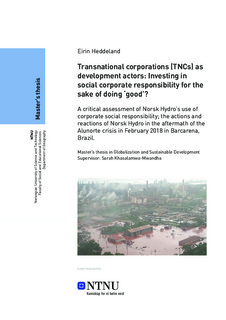| dc.description.abstract | Denne oppgaven analyserer transnasjonale selskape (TNCs) som utviklingsaktører gjennom å se på det norske transnasjonale aluminiumsselskapet Norsk Hydro og deres utvinningsaktiviteter i Brasil. Mer spesifikt utforsker oppgaven Hydro sitt aluminiumsraffineri Alunorte i byen Barcarena, Pará, som i perioden 16 til 18 februar 2018 var ansvarlig for tre ulovlige utslipp og lekkasjer.
Avhandlingen undersøker reaksjonene og handlingene til selskapet i etterkant av Alunorte-situasjonen ved bruk av Reactive-Defensive-Accomodative-Proactive (RDAP)- skalaen. Ved hjelp av interessentteorien (Stakeholder theory) undersøker den også forandringen i interessentrelasjoner med lokalsamfunnet i Barcarena og delstaten Pará i etterkant av Alunorte-krisen og hvordan dette har bidratt til endringer i Hydros samfunnsansvar (CSR) strategi. Oppgaven bruker dokumentanalyse basert på Hydros årsrapporter 2016-2018, komplementert med annen sekundær litteratur som avisartikler, organisasjonsrapporter og pressemeldinger med dekning av saken.
Oppgaven undersøker retorikken Hydro har brukt som ansvarlig aktør i lokalsamfunnet i Barcarena og Pará etter lekkasjene. Ved å undersøke reaksjonene og handlingene til selskapet etter Alunorte-situasjonen viser oppgaven at Hydro måtte gå gjennom alle fasene av RDAP-skalaen for å adoptere en pro-aktiv holdning til lokalsamfunnet. Videre avdekker analysen av årsrapportene 2016-2018 at store investeringer til lokalsamfunnet først kom etter krisen hadde skjedd. CSR i etterkant av lekkasjen fungerte som en viktig PR-strategi for Hydro, for å fikse ødelagte rykter og relasjoner.
Som følge av Alunorte-situasjonen tok Hydro moralske forpliktelser overfor lokalsamfunnet, ved å sikre at en del av selskapets fortjenester nå er dedikert til å støtte lokal samfunnsutvikling som for eksempel the Sustainable Barcarena Initiative (SBI). De tok likevel ikke ansvar for etiske forpliktelser, som å dempe eller kompensere for tap eller skader på lokalmiljøet som følge av deres gruvedrift. Samfunnsmessig konsekvenser fikk høy betydning, mens miljø konsekvensene som vannkvalitet knapt ble fokusert på.
Hydro tok kun ansvar for moralske forpliktelser, som utdanning, kapasitetsbygging og matkuponger. Etiske forpliktelser, som å sikre et levedyktig lokalmiljø, ble ikke tatt hensyn til. Dette forsterker argumentet om at TNCs utelukkende tar en pro-aktiv holdning til interessenter med stor påvirkningskraft. I dette tilfellet var den mektigste interessenten lokalsamfunnet. I lengden påvirker derimot lokalmiljøet velferden til lokalsamfunnet, og dette kan indikere at profittmotivene til TNCs som Hydro ikke er kompatible med samfunn- og miljøutvikling. Initiativene som fulgte etter Alunorte krisen er gode og støtter samfunnsutvikling, men forurensning av vann og miljø som fulgte av lekkasjen ble aldri adressert. Denne oppgaven fremhever dermed at CSR-initiativene tar opp moralske forpliktelser ved å dele selskapets fortjeneste med lokalsamfunnet som ressurseiere. Imidlertid mislykkes de i å oppfylle den etiske forpliktelsen det er å redusere miljøbelastningen.
Stikkord: Transnasjonale selskaper, samfunnsansvar, lokalsamfunn, gruveindustri | |
| dc.description.abstract | This thesis analyzes transnational corporations (TNCs) as development actors focusing on the Norwegian based transnational aluminum corporation, Norsk Hydro and their extractive mining operations in Brazil. It explores the activities of Norsk Hydro, which have been linked to three illegal emission and leakages from their aluminum refinery Alunorte on 16th to 18th February 2018, in Barcarena, Brazil.
Thus, the thesis investigates the reactions and actions of the corporation in the aftermath of the Alunorte situation through Reactive-Defensive-Accommodative-Proactive (RDAP)-scale. Using the stakeholder theory, it also examines the change in the stakeholder relations with a specific focus on the local community in the aftermath of the Alunorte crisis, and how this has altered their corporate social responsibility (CSR) strategy. The thesis uses a document analysis method based on Hydro’s annual reports 2016-2018 complemented with other secondary literature such as newspaper articles, organization reports and press releases covering the crisis.
The rhetoric of responsible capitalism of Hydro towards local community in Barcarena and Pará is investigated, through analyzing the reactions and actions of the corporation in the aftermath of the Alunorte situation. This thesis demonstrates that Hydro needed to go through all phases of the RDAP-scale to reach a proactive stance to local community. Further, analyzing the annual reports 2016-2018, it shows how large investments in local community happened only after the crisis. Consequently, CSR functions as an essential Public Relations (PR) strategy for mending broken reputations and relationships.
After the admittance of the leakages pertaining to the Alunorte situation, the corporation took on moral obligations towards the local community. Ensuring that some share of the company’s profits was dedicated to support community development, such as the Sustainable Barcarena Initiative (SBI). Nevertheless, not accounting for their ethical obligations of mitigating or compensating for whatever loss or damage that affected the local community, as a consequence of their mining operations. There was little focus on improving the local environment particularly in such as water purification. Consequently, the societal impact gained importance while the environmental hardly was focused on.
Merely taking on their moral obligation such as providing capacity building, education and food coupons, and not their ethical responsibility, ensuring a viable local environment, supports the argument that TNCs solely take a proactive stance to powerful stakeholders. In this case, the most powerful stakeholder was the local community. In the long run, the damage of the local environment also affects the welfare of the local community. Indicating that the profit motive of TNCs is not compatible with social welfare and environment. Based on the initiatives after the Alunorte crisis, the local community development was prioritized which is good, however, the water contamination and pollution caused by the leakage was not addressed. Therefore, the thesis highlights, that the CSR initiatives address the moral obligation of sharing company profits with the community as resource owners. However, they fail to meet the ethical obligation of mitigating the environmental impacts.
Keywords: Transnational corporations, corporate social responsibility, local community, mining industry | |
